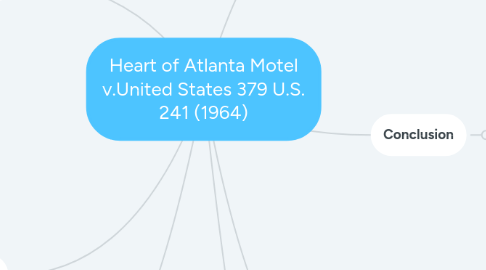
1. Analysis/Application
1.1. Plantiff
1.1.1. The owner of the Heart of Atlanta Hotel, Moreton Rolleston, interpreted and presented the rule by stating that the Civil Rights Act was far exceeding the power given to Congress in relation to interstate commerce. He also claimed his Fifth Amendment right was violated - specifically the violation of his right to operate his business in a specific way and choose specific customers resulted in unjust deprivation of his business. He also argued his Thirteenth Amendment right was violated and he was being placed in involuntary servitude by forcing him to cater to specific patrons.
1.2. Defendant
1.2.1. US Government
2. Conclusion
2.1. The rule of interstate commerce applies here as the law states that Congress has the power to regulate commerce among the states. As a hotel is often a business with customers form out of state it falls under this jurisdiction
2.2. The District court ruled in favor of the United States and mandated that the Heart of Atlanta Hotel allow African Americans be allowed to patronize the establishment. The Supreme Court upheld the decision.
3. Impact
3.1. US vs Lopez (1995)
3.1.1. This case was the first ruling by the courts that the US government had exceeded its power to legislate the commerce clause.
3.1.1.1. This case involves a San Antonio high school student's challenge to the Gun-Free School Zones Act of 1990. The court decided that despite the Commerce Clause, the government's power did not extend to the carrying of handguns.
3.1.1.1.1. Post decision, the Gun-Free School Zones Act of 1990 was amended and since applies only to guns moved by interstate commerce.
3.2. Boy Scouts of America v. Dale, (2000) The issue in this case was twhether New Jersey's public accommodations law could protect the rights of a gay man in his position as as an assistant scoutmaster. The Court ruled that the Boy Scouts of America is a private organization and that a State can not require private organizations to hold certain beliefs. New Jersey's public accommodations law infringed the Boy Scouts' freedom of expressive association and interfered with their right to oppose homosexual conduct.
4. Importance
4.1. A business professional would care about this decision because it represents one of many turning points in the control that the government is given over private businesses in relation to the type of customer they choose to serve and their legal rights in denying service. It brings into question what the legal responsibilities of a private business are specifically.
5. Influence
5.1. Businesses were influenced by this case in the sense that they need to consider their biases in how they sell to their customers. Are clothing companies legally responsible for manufacturing clothing for all sizes? Can the government regulate this?
5.2. Businesses need to know thief rights to protect themselves against civil suits by customers who may feel slighted
6. Facts
6.1. Parties
6.1.1. Heart of Atlanta Motel, Inc
6.1.2. United States
6.2. What Happened
6.2.1. The Heart of Atlanta Motel, in direct defiance of the Civil Rights Act, refused to rent rooms to African American customers. This also went against the laws surrounding interstate commerce which were upheld by Congress in relation to the Civil Rights Act. The owner of the hotel filed a suit on the claim that the government was exceeding its authority in managing interstate commerce and also claimed that his fifth amendment and thirteenth amendment rights were being violated by forcing him to rent rooms to African Americans.
6.3. Procedural History
6.3.1. The case was significant in history as it was pivotal in allowing the US government to compel private businesses to adhere to the Civil Rights Act of 1964.

